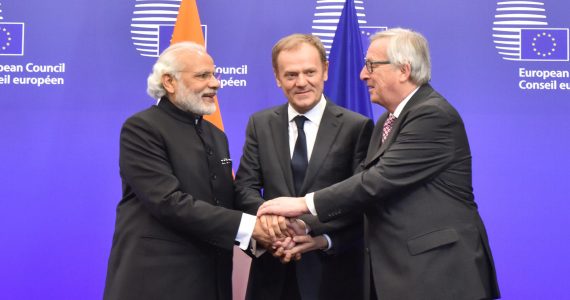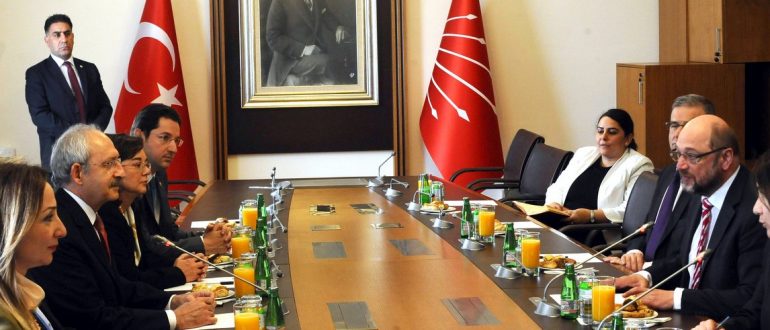
Human Rights Abuses in Kashmir: The Ultimate Impasse to an EU-India Free Trade Agreement?
With an ever-assertive China in the East and Trump’s America in the West, a strong EU-India relationship could prove to be fruitful and mutually beneficial. Negotiations for a Bilateral Trade and Investment Agreement (BITA) between the EU and India started in June 2007; but progress has been slow, obstacles plentiful, and discussions continue until this day. The European Commission has progressively incorporated and enshrined the principles of sustainable development in the Union’s trade policy, but the Commission’s compliance with these principles has been questioned by many. Despite evidence that Indian State Forces have conducted widespread human rights abuses in the Kashmir Valley for decades – trade negotiations continue, and a BITA comes ever closer. Could Kashmir prove to be a thorn in New Delhi’s side one more time and become a sticking point in these trade negotiations?
EU-India Trade Relations
Even though the EU is India’s largest trading partner, India lies far behind as the EU’s ninth largest trading partner. In 2017, EU-India relations accounted for €77.1 billion in bilateral trade in goods, €28.9 billion in services, and €72.9 billion of direct foreign investments into India by the EU (European Commission Directorate-General for Trade, 2018). The EU has yet to take full advantage of the trading opportunities that India offers – with the world’s fastest-growing economy and middle class, and a market of over one billion consumers, the possibilities are enormous.
Since its introduction in 1971, India has benefited from the EU’s Generalised System of Preferences (GSP) which currently reduces customs by approximately 55% on imports from India. To avail of such privileges, India must ratify and comply with several fundamental human rights treaties, including the International Covenant on Civil and Political Rights (ICCPR), the Convention on the Elimination of All Forms of Discrimination Against Women (CEDAW), and the Convention Against Torture and other Cruel, Inhuman or Degrading Treatment or Punishment (UNCAT). If it is determined that India does not comply with the requirements of the GSP, the Commission may revoke its privileges. The Commission, however, is extremely reluctant to do so with developing countries and has only ever taken such drastic actions in three cases, none of which targeted India.
After the International Monetary Fund (IMF) imposed liberalisation of the Indian economy in the early 1990s, the European Community and India signed a development cooperation agreement in 1993 and the two continuously moved closer together as the post-Cold War era progressed. A BITA has been under negotiation since Manmohan Singh’s United Progressive Alliance (UPA) government in 2007 but ran into difficulty – largely due to the EU’s regulatory protectionism in the services sector and issues related to India’s intellectual property regime – and negotiations were suspended in May 2013 (Singh & Priya, 2014). The BITA aims to open both markets to goods, services, and access to public procurement contracts. Further; the BITA aims to create a stable framework for investment with investment protection by codifying rules that frame trade, such as intellectual property and competition, and promoting sustainable development by ensuring growth in trade does not negatively affect the environment or social and labour rights (European Commission Directorate-General for Trade, 2018).
When free-marketeer Narendra Modi ascended to the Prime Ministership of India in 2014, many in Europe looked with hope and optimism at the renewed prospects of an EU-India trade deal. Instead, the new Prime Minister laid out his ‘Act East’ foreign policy aimed to curb Chinese influence in the region by increasing economic and diplomatic ties with the member states of the Association of Southeast Asian Nations (ASEAN). Initially, this seemed to signal a cooling period in India’s trade ambitions with Europe for the foreseeable future. But India’s service economy and protectionist policies of ASEAN member states, particularly when it comes to services, have limited India’s growth in the region (Kundu, 2018). India has not seen the return it has hoped in the ASEAN market, which has caused Modi to look elsewhere to fulfil India’s full potential.
With the relatively modest returns from his ‘Act East’ policy, Modi’s government has warmed to Europe as his term has progressed. His government has devoted substantially more time and effort to Europe than previous UPA governments. The revitalisation of EU-India relations was kickstarted with a high-profile summit in Delhi in October 2017. Further, the Prime Minister embarked on a charm offensive in April 2018 when he visited three EU member states to promote Europe-India relations and the President of India visited three additional EU member states in September 2018. Despite this, these efforts have so far proved fruitless in producing a BITA or even relaunching negotiations between India and the EU.
The EU works to ensure its trade policy promotes sustainable development. Respect for human rights is one of four fundamental principles of sustainable development which the EU claims to espouse in its trade policy, particularly when conducting trade agreements with non-member third states. Human rights first appeared in the EU’s trade policy through the 1990 Argentina-EU trade deal. This commitment to the promotion of human rights in trade was formalised with several non-binding resolutions adopted by the European Parliament and the Council on the promotion of human rights and democracy through clauses in EU agreements, notably in 1996 and 2006. As part of the process of developing a BITA between the EU and India which upholds these principles, the Commission conducted a sustainability impact assessment in 2009. India has largely rejected the EU’s approach of promoting human rights in trade agreements, favouring these standards to be enforced outside a trade agreement in alternative, less accountable, fora (Jatkar, 2012).
Despite the Commission’s claims of demanding respect for fundamental human rights, it has drawn heavy criticism for concluding trade and economic agreements with states who fail to uphold these foundational principles of the EU, most recently upon the conclusion of a free trade agreement with Vietnam (Unrepresented Nations & Peoples Organisation, 2018).
India’s Human Rights Record in Kashmir
Human rights abuses have been widespread and systematic in the state of Jammu and Kashmir, disputed by India and Pakistan ever since the independence of the two states and their partition in 1947. After the disputed 1987 state election where the Islamist party, the Muslim United Front, won only four of 76 seats in the state Assembly; a popular Islamic militant insurgency in favour of succession from India began in 1989. The renewed violence resulted in the mass exodus of an estimated 150,000 Kashmiri Pandits, who were the last remaining Hindu community in the Kashmir Valley, to other parts of India. This migration of Kashmiri Pandits created a virtually homogenous population of Sunni Muslims in the Kashmir Valley, making Jammu and Kashmir the only Muslim majority state in India.
Shortly after the beginning of the insurgency in July 1990, Indian Security Forces were granted special powers and legal immunity under an Armed Forces Special Powers Act (AFSPA). Human rights groups and non-governmental organisations have claimed that this act has allowed security forces to operate with impunity and a complete disregard for human rights (Human Rights Watch, 2008). Human rights abuses have been rife and pervasive since the insurgency began, with accusations levied against the insurgents and Indian Security Forces. Extra-judicial killings, disappearances, torture and sexual abuse have all been reported by numerous sources on several occasions (Essa, 2015). One such example of the ominous human rights situation in Kashmir was the discovery of numerous unmarked graves near the Line of Control, the demarcation line between Indian- and Pakistani-Administered Kashmir; 1,000 in 2008 and a further 2,700 in 2011 (International People’s Tribunal on Human Rights and Justice in India-Administered Kashmir, 2009). In 2014, the Committee on the Elimination of Discrimination against Women, the UN monitoring body of CEDAW, expressed deep concern about the reported high level of violence, including enforced disappearance, against women in Indian-Administered Kashmir (United Nations Committee on the Elimination of Discrimination against Women, 2014). Both the UN High Commissioner for Human Rights and the UN Human Rights Council have requested India to repeal the AFSPA, with the UN Special Rapporteur on Extrajudicial, Summary or Arbitrary Executions stating that the act “clearly violates international law” (Nita, 2012). Furthermore, the UN High Commissioner for Human Rights published its first-ever report in mid-2018 on the human rights situation in Kashmir – lambasting the widespread arbitrary arrests and detention, enforced disappearances, excessive use of force, restrictions on the right to freedom of expression, sexual violence, use of military courts, use of torture and more (Office of the United Nations High Commissioner for Human Rights, 2018).
The three decades since the start of the insurgency in 1989 have marked the bloodiest chapter of the Kashmir Conflict. The Indian government’s official figures indicate 47,000 fatalities since the beginning of the insurgency, over 20,000 of which have been civilians. The All Parties Hurriyat Conference – an alliance of leading political, civil, and religious organisations in Kashmir dedicated to Kashmiri Separatism and backed by several militant groups – have contested this number, claiming it is closer to 100,000 (Ismail, 2008).
Conclusion
If India does not radically alter and realign its policy in Indian-Administered Kashmir and the EU continues upon its current trajectory, the Commission must inevitably choose whether the economic enrichment of a BITA is worth comprising the foundational principles of the Union. The EU’s recent conclusion of free trade agreements with one-party dictatorships of Vietnam and Singapore does not bode well for the robust promotion of and respect for human rights within its free trade agreements. These agreements lay the groundwork for the EU to move from a normative global actor to one with pliable principles which employs Bismarckian realpolitik for economic gain.
Bibliography
Essa, Azad 2015: ‘India ‘covering up abuses’ in Kashmir’ (Al Jazeera)
European Commission Directorate-General for Trade 2018: ‘India – Trade Statistics’
Human Rights Watch 2008: ‘India: Repeal Armed Forces Special Powers Act’
International People’s Tribunal on Human Rights and Justice in India-Administered Kashmir 2009: ‘Buried Evidence – Unknown, Unmarked, and Mass Graves in Indian-administered Kashmir’
Ismail, Danish 2008: ‘India revises Kashmir death toll to 47,000’ (Reuters News)
Jatkar, Archana 2012. ‘Human Rights in the EU-India FTA: Is it a viable option?’ (GREAT Insights 1/2) pages 9-10
Kundu, Sampa 2018: ‘ASEAN-India: Challenges in Economic Partnership’ (Institute for Defence Studies and Analysis)
Office of the United Nations High Commissioner for Human Rights 2018: ‘Report on the Situation of Human Rights in Kashmir: Developments in the Indian State of Jammu and Kashmir from June 2016 to April 2018’
Nita, Bhalla 2012: ‘U.N. says India should scrap AFSPA in Kashmir’ (Reuters News)
Singh, Ritesh Kumar & Priya, Prachi 2014: ‘What’s Holding Back the India-EU FTA?’ (The Diplomat)
United Nations Committee on the Elimination of Discrimination against Women 2014: ‘Concluding observations on the combined fourth and fifth periodic reports of India’
Unrepresented Nations & Peoples Organisation 2018: ‘UNPO Concerned About Impacts of EU-Vietnam FTA on Human Rights’



